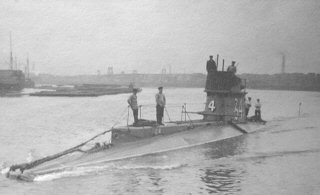
HMS C1 was one of 38 C-class submarines built for the Royal Navy in the first decade of the 20th century. The boat survived the First World War and was sold for scrap in 1920.
HMS C21 was one of 38 C-class submarines built for the Royal Navy in the first decade of the 20th century. The boat survived the First World War and was sold for scrap in 1921.

HMS C3 was one of 38 C-class submarines built for the Royal Navy in the first decade of the 20th century. The boat was used to demolish a viaduct during the Zeebrugge Raid in 1918.

HMS C4 was one of 38 C-class submarines built for the Royal Navy in the first decade of the 20th century. The boat survived the First World War and was sold for scrap in 1922.

HMS C12 was one of 38 C-class submarines built for the Royal Navy in the first decade of the 20th century. The boat survived the First World War and was sold for scrap in 1920.

HMS C14 was one of 38 C-class submarines built for the Royal Navy in the first decade of the 20th century. The boat survived the First World War and was sold for scrap in 1921.

HMS C15 was one of 38 C-class submarines built for the Royal Navy in the first decade of the 20th century. The boat survived the First World War and was sold for scrap in 1922.

HMS C23 was one of 38 C-class submarines built for the Royal Navy in the first decade of the 20th century. The boat survived the First World War and was sold for scrap in 1920.
HMS C26 was one of 38 C-class submarines built for the Royal Navy in the first decade of the 20th century.

HMS C38 was one of 38 C-class submarines built for the Royal Navy in the first decade of the 20th century. The boat survived the First World War and was sold for scrap in 1919.

HMS C37 was one of 38 C-class submarines built for the Royal Navy in the first decade of the 20th century. The boat survived the First World War and was sold for scrap in 1919.

HMS C36 was one of 38 C-class submarines built for the Royal Navy in the first decade of the 20th century. The boat survived the First World War and was sold for scrap in 1919.

HMS C31 was one of 38 C-class submarines built for the Royal Navy in the first decade of the 20th century. She struck a mine in 1915 and sank with the loss of all hands.

HMS C34 was one of 38 C-class submarines built for the Royal Navy in the first decade of the 20th century. The boat was sunk by a German U-boat in 1917.
HMS C28 was one of 38 C-class submarines built for the Royal Navy in the first decade of the 20th century. The boat survived the First World War and was sold for scrap in 1921.
HMS C35 was one of 38 C-class submarines built for the Royal Navy in the first decade of the 20th century.
HMS C27 was one of 38 C-class submarines built for the Royal Navy in the first decade of the 20th century.
HMS C29 was one of 38 C-class submarines built for the Royal Navy in the first decade of the 20th century. C29 served in the First World War until she was sunk by mine on 29 August 1915.
HMS C32 was one of 38 C-class submarines built for the Royal Navy in the first decade of the 20th century. The boat ran aground in the Baltic in 1917 and had to be destroyed to prevent her capture.

HMS C33 was one of 38 C-class submarines built for the Royal Navy in the first decade of the 20th century. The boat sank with all hands on 4 August 1915 after hitting a mine.








